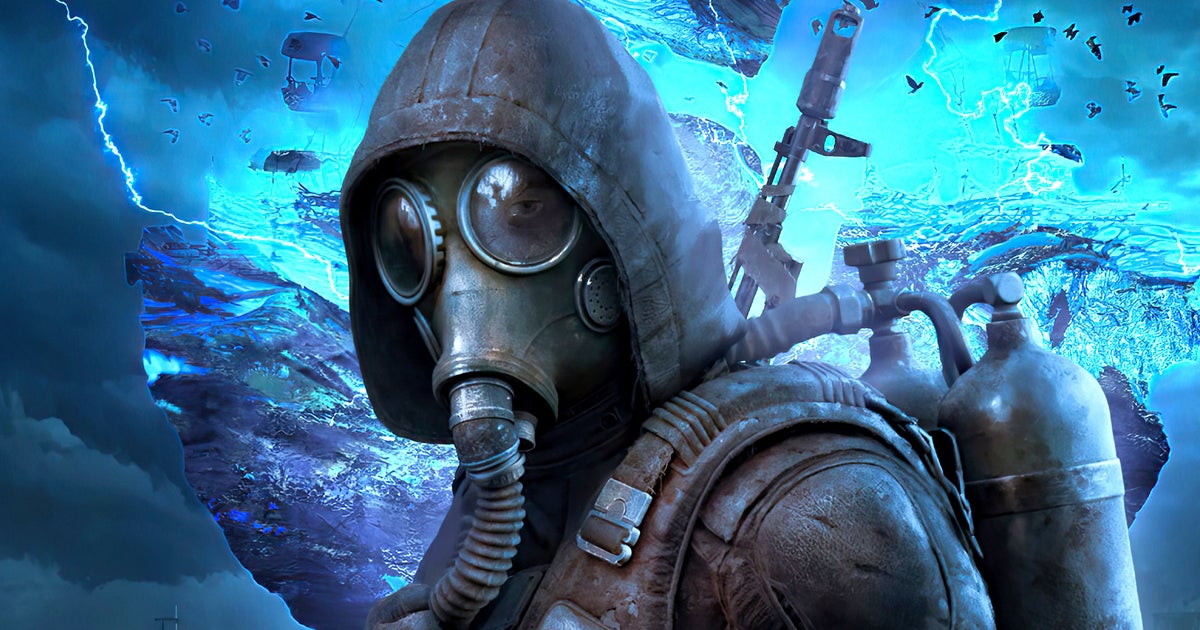Stalker 2: Heart of Chornobyl lives up to its legacy with incredible atmosphere, engaging systemic gameplay and a fair amount of technical issues. Thankfully, GSC Game World’s day one patch has solved a lot of the woes suffered by reviewers, but the game still suffers from everything to minor, amusing bugs to more serious issues and heavy CPU utilisation. Suit up Stalker, let’s explore the lay of the land on PC and Xbox Series X/S.
Stalker 2’s greatest technical strengths are in its environments, full of foreboding ambience, authentic-looking props and chaotic NPC behaviour. The look and feel of The Zone is seared into the brains of many millenial PC players from the original 2007 cult classic, and the sequel hits many of the same notes while using generationally more advanced Unreal Engine 5 technology.
The wild vegetation, for example, stretches far out into the distance, making for some impressive vistas replete with grass, bushes and trees. This isn’t Nanite geometry – the game ships on Unreal Engine 5.1 versus the current 5.5 – so it’s possible to notice flips between different levels of detail. The vegetation’s shadowing also isn’t ideal, lacking treatment from the game’s virtual shadow maps (VSMs) or being wholly shadow casting only in screen-space. Still, it probably takes a lot of GPU cycles to enable such a consistent density and distance to the game’s vegetation, and the overall effect is still impressive.
Another strength is the game’s hard surface modelling and texturing, which must take up a significant proportion of the 154GB install size. Textures are uniformly extremely high-res, and any old piece of rusty junk holds up to close scrutiny. Model detail is enhanced through the use of Nanite, with real geometric detail backing up the high-res textures visible in bricks, concrete, machinery and broken-down vehicles. On most objects in the game world, it’s a struggle to find any visible polygon edges, and almost every asset looks like it belongs to the weathered game world it inhabits.
Weapon models are a particular highlight, with incredible animation work and impressive depiction of wear visible every time you clear a jam. The materials are praise-worthy too, with weapons such as shotguns showing great differentation between the metals of the body and the wood grain of the stock and grips. Every gun I’ve encountered so far looks excellent – and sounds great when fired too.
Beyond the finer detail and vegetation that make The Zone come alive, the game’s weather and environmental hazards are masterfully done. There is rain, of course, with darkened volumetric clouds, but there are also sci-fi storms that stain the world below yellow as particles fly close to the camera, or lightning strikes that show off volumetrics (when they’re not killing you). I was pleasantly surprised by the variety here.
The 2007 release barely featured cutscenes, but there are a good number here. These are similar to those of a modern Call of Duty game, with a first-person perspective showing your character interacting with the environment or NPCs with expressive hand motions. Generally, other characters are well animated, with realistic hair and skin, and the facial mimicry means mouth movements line up well with the dialogue in Ukrainian and English alike. I was also glad to hear that the English voice actors didn’t put on stereotypical accents, though opting for the Ukrainian audio with subtitles is worth trying too.
Stalker 2’s presentation is impressive then, but I do have small criticisms of some visual elements. First, there are too few shadow-casting lights, something I noticed with people gathered around a campfire. Similarly, muzzle flash shadows and flashlight shadows are also oddly missing in Stalker 2, having been included in the 2007 game at a time when this was still an absolute rarity. This strips the game of some atmosphere, and I’d love a high-end shadow option to enable shadows from more sources.
The biggest issue comes from Lumen global illumination. The game suffers from many of the typical software Lumen limitations, relying on scren space information to do diffuse lighting and specular reflections. This can cause light to leak through solid objects, or shadows to appear and disappear depending on where you look. Again, I’d appreciate seeing a hardware Lumen option in a future patch to avoid these issues and even get some nice bonuses, like vegetation being added in reflections. Developers GSC Game World hinted that this sort of thing could be added post-launch, so my fingers are firmly crossed.
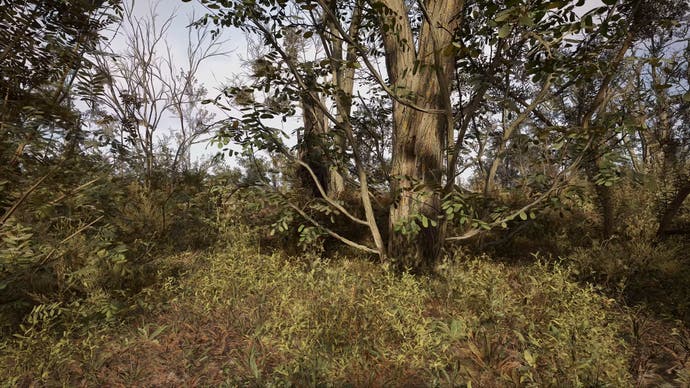
While I spent most of my time playing Stalker 2 on PC, the game plays well on Xbox Series X and Series S too. Series X gets a 30fps quality and 60fps performance mode, while Series S is a single mode 30fps experience. Pixel counting is a challenge, with dynamic resolution scaling and TSR upscaling obscuring the internal resolution, but Series S looks to range from 648p to 864p, reconstructed up to 1080p. Series X’s performance mode is slightly higher res, from 864p lowest to 1152p highest, reconstructed up to a (soft-looking) 4K. The quality mode looks a lot better, with an internal resolution at or around 1440p.
There are some necessary settings sacrifices here too – vegetation fidelity, transparency, hair, shadow quality and global illumination – but the overall impact of the game’s visuals are preserved. The quality mode on Series X fares the best, with Series X in performance mode and Series S having more visual sacrifices. It is possible to spot more imprecision and jitter in shadows, for instance, or flickering lighting in some scenes. Hair is simplified, as seen in the game’s intro, and translucent objects like glass windows can lack proper shading too.
Finally, you may notice the game is a little dark on Xbox, so you may need to change from the default Rec 709 colour space to sRGB unless you’re playing in a dark room.
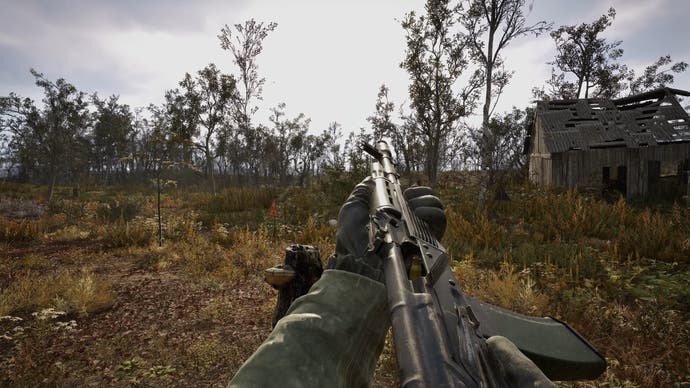
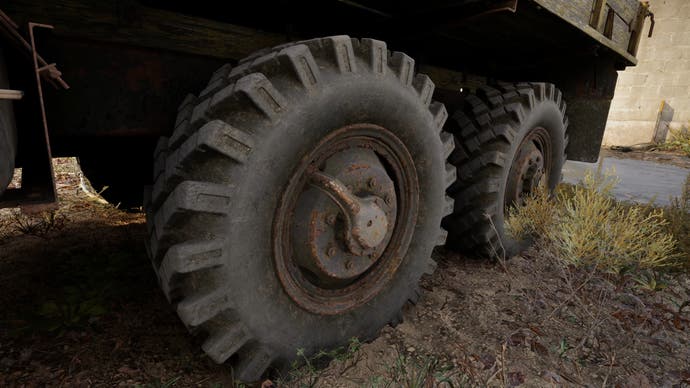
With that out of the way, let’s talk technical issues – starting with performance. Frame-rates and frame-time stability has improved significantly following the day one patch, but the game remains very CPU-heavy and prone to stutters on PC and console alike. On PC, there’s a long shader precompilation step that appears to work perfectly. Instead, I think the CPU-related performance issues are due to streaming data during world traversal.
Running towards the first town on a high-end Ryzen 7 7800X3D – the second-fastest gaming CPU – there are frame-time spikes in the 20ms and 30ms range – and these were almost twice as bad in the pre-release version of the game. Even at epic settings that exceed the Series X release, we’re CPU-limited up to around 100fps. On a CPU that’s closer to Series X/S spec, the Ryzen 5 3600, it’s disastrous to run the game unlocked due to its spiky, CPU-limited performance profile. Frame-time spikes can exceed 50ms, with frame-rates peaking in the 50s. And this is for an area of the game without enemies or other NPCs, which add their own CPU burdens.
When you arrive at Zallisya and there are NPCs, CPU performance becomes erratic even on the 7800X3D, with frame-time spikes from 30ms to 50ms. Frame-rates drop momentarily into the 40s, stabilising to around a 60fps average – unbelievably slow for a CPU of this calibre. On the Ryzen 3600, the frame-rate is just over 30fps, with initial frame-time spikes of 50-80ms that smooth out to around 50ms – still quite poor! This isn’t a one-off encounter either, as any area with 20 NPCs or more incurs a similar performance penalty. I once hid in a cellar during a storm, and when all of the NPCs in the area did the same, frame-rates on the 7800X3D dropped to 40fps. Suffice it to say, this game is extremely CPU-limited.
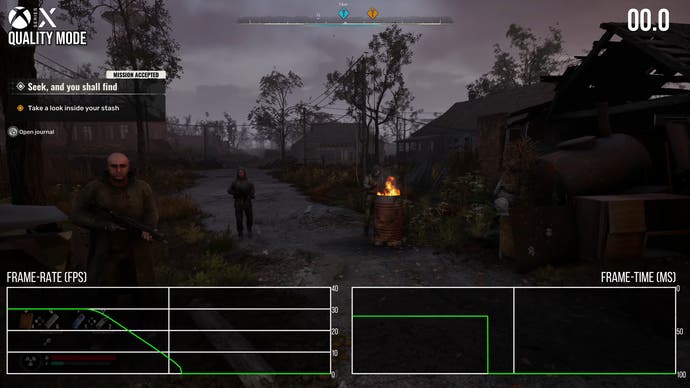
This CPU limitation also affects the console version, most notably the Xbox Series X in performance mode, which rarely hits its 60fps target and is normally in the 40s or 50s during combat or exploration. Therefore, a VRR display is nearly essential, though the game can still feel choppy in CPU-limited moments.
When visiting large towns on Series X, rather than the frame-time spikes observable on PC, we saw the game freeze entirely for around six seconds – absolutely brutal. Frame-times level out afterwards, but Series X is still around 40fps. Frame-times are also erratic when the camera moves, disrupting the VRR presentation. The full freeze needs to be fixed, as this is pretty much never acceptable in a shipping game.
Given this outlook, the Series X’s quality mode is preferable, as is the Series S’s single mode experience. Due to the frame-time being capped at 33.3ms, the consoles are able to keep this almost all of the time, with exceptions largely coming in areas with high NPC counts and even here frame-rates drop only to 28 or 29fps – not too bad. However, we still saw the same six-second freeze when entering Zallisya on Series X quality mode and Series S. This needs to be fixed, once again, and motion blur could also do with being added for a smoother-looking presentation. There is a setting for this in the menus, but it only applies to cutscenes at present.
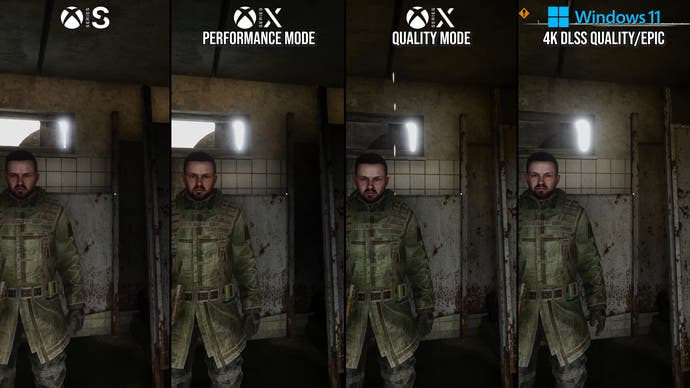
That’s the current state of affairs, but fingers crossed that performance can be improved with future patches. The game is always going to be extremely CPU-heavy, given its dense world and smart NPCs, but there’s still plenty of room for optimisation.
In the meantime, it’s worth considering the use of a frame-rate cap on PC to achieve a more consistent presentation. On a Ryzen 5 3600, I preferred using a 30fps cap, while on the 7800X3D a 60fps cap makes sense to get a completely smooth frame-time graph in all but the most challenging scenarios.
Despite the technical challenges, Stalker 2 is well worth your time and lives up to the promise of the 2007 cult classic. The version of the game available to players now is much-improved compared to that faced by early reviewers, but more work needs to be done to let the game hit its full potential.

